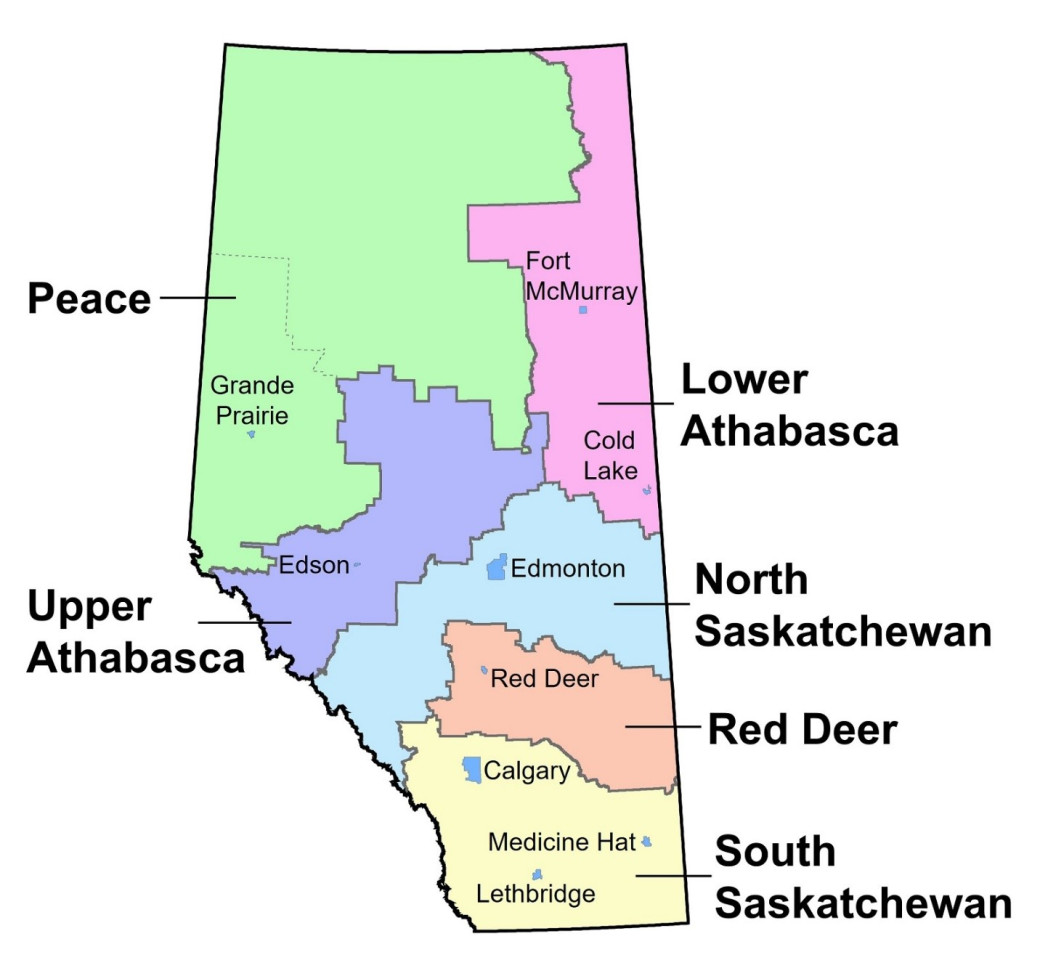Overview
The Canadian Ambient Air Quality Standards (CAAQS) are part of a collaborative national Air Quality Management System (AQMS), to better protect human health and the environment.
In October, 2012, the Canadian Council of Ministers of the Environment (CCME) agreed to the new CAAQS for fine particulate matter (PM2.5) and ozone. New CAAQS for sulphur dioxide (SO2) and nitrogen dioxide (NO2) were developed and will be effective in 2020.
The CCME have developed a State of the Air website to provide information on the AQMS and CAAQS across Canada.
Management levels and standards
As part of the AQMS, Alberta was divided into six air zones. The ambient monitoring data for each air zone is assessed annually to make sure they meet the national air quality standards and management levels.
The management levels are represented by the colours green, yellow, orange, and red. Each management level has an air quality objective:
| Management level | Air quality objective |
|---|---|
| Green | To maintain good air quality through proactive air management measures to keep clean areas clean. |
| Yellow | To improve air quality using early and ongoing actions for continuous improvement. |
| Orange | To improve air quality through active air management and prevent exceedance of the CAAQS. |
| Red | To reduce pollutant levels below the CAAQS through advanced air management actions. |
When an air zone report indicates that an air zone is in the orange or red management level, a management plan must be developed for that air zone. The Management plans section below provides information on the management plans in place for Alberta.
Air zone reports
The annual air zone reports along with supplementary information on the CAAQS and the document outlining Alberta’s implementation of the Air Zone Management Framework are available below.
- Alberta Air Zones Reports
- Alberta Implementation of the Air Zone Management Framework for Fine Particulate Matter and Ozone
CAAQS tables
The following tables outline the CAAQS effective dates and management levels for each substance.
| Unit | Definition |
|---|---|
| ppb | Parts per billion |
| µg m-3 | The weight, in micrograms, of the substance in one cubic metre of air |
Table 1: O3
| Management Level | O3 8-hour (ppb) | ||
|---|---|---|---|
| 2015 | 2020 | 2025 | |
| Red (CAAQS) | > 63 | > 62 | > 60 |
| Orange | 57 to 63 | 57 to 62 | 57 to 60 |
| Yellow | 51 to 56 | 51 to 56 | 51 to 56 |
| Green | ≤ 50 | ≤ 50 | ≤ 50 |
Table 2: PM2.5
| Management Level | PM2.5 24-hour (µg m-3) | PM2.5 annual (µg m-3) | ||
|---|---|---|---|---|
| 2015 | 2020 | 2015 | 2020 | |
| Red (CAAQS) | > 28 | > 27 | > 10.0 | > 8.8 |
| Orange | 20 to 28 | 20 to 27 | 6.5 to 10.0 | 6.5 to 8.8 |
| Yellow | 11 to 19 | 11 to 19 | 4.1 to 6.4 | 4.1 to 6.4 |
| Green | ≤ 10 | ≤ 10 | ≤ 4.0 | ≤ 4.0 |
Table 3: SO2
| Management Level | SO2 1-hour (ppb) | SO2 annual (ppb) | ||
|---|---|---|---|---|
| 2020 | 2025 | 2020 | 2025 | |
| Red (CAAQS) | > 70 | > 65 | > 5.0 | > 4.0 |
| Orange | 51 to 70 | 51 to 65 | 3.1 to 5.0 | 3.1 to 4.0 |
| Yellow | 31 to 50 | 31 to 50 | 2.1 to 3.0 | 2.1 to 3.0 |
| Green | ≤ 30 | ≤ 30 | ≤ 2.0 | ≤ 2.0 |
Table 4: NO2
| Management Level | NO2 1-hour (ppb) | NO2 annual (ppb) | ||
|---|---|---|---|---|
| 2020 | 2025 | 2020 | 2025 | |
| Red (CAAQS) | > 60 | > 42 | > 17.0 | > 12.0 |
| Orange | 32 to 60 | 32 to 42 | 7.1 to 17.0 | 7.1 to 12.0 |
| Yellow | 21 to 31 | 21 to 31 | 2.1 to 7.0 | 2.1 to 7.0 |
| Green | ≤ 20 | ≤ 20 | ≤ 2.0 | ≤ 2.0 |
Alberta's air zones
The following map shows Alberta's six air zones, which are based on the Land-use Framework Regions.

The CAAQS replace the Canada-wide Standards for Fine Particulate Matter and Ozone, which were established in June 2000 by the Canadian Council of Ministers of the Environment (CCME). The Clean Air Strategic Alliance (CASA) developed a Particulate Matter and Ozone Management Framework and the Government of Alberta adopted this framework as Alberta's commitment to achieve Canada-wide Standard levels by the 2010 target date.
For more information on the CASA Particulate Matter and Ozone Management Framework and results of historical annual assessments, please see:
Management plans
The Canadian Ambient Air Quality Standards (CAAQS) assessment titled Alberta: Air Zones Report 2011 - 2013 for fine particulate matter and ozone was published in September 2015 for 2011 to 2013 monitoring data. In response to this report, Alberta committed to developing regional action plans for all six air zones.
The following reports provide information on the management level for each air zone and a summary of management actions committed to by the Government of Alberta in response to the assigned management level in each region.
Lower Athabasca Air Zone
North Saskatchewan Air Zone
Peace Air Zone
Red Deer Air Zone
2017
2016
- Red Deer Air Zone Fine Particulate Matter Response – Action Plan
- Red Deer Fine Particulate Matter Response
- Red Deer Fine Particulate Matter Response Science Report